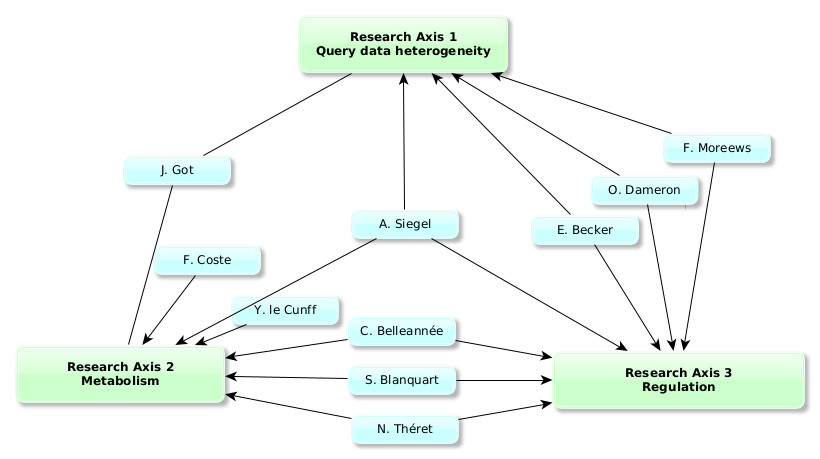
Team presentation
Our common “knowledge-based approach” aims at gaining in sensitivity and expressivity through a discrete and structured abstraction of genomic and physiological information, compared to statistical methods that require lots of information or perturbations datasets to be efficient. Our methods are based on a purely symbolic computational approach addressing integrative biology with logical constraints (identifying genomic and physiological specificities of the studied species), sequence analysis with formal languages (characterizing actors in genomic sequences), dynamical modeling with symbolic dynamics (quantifying the impact of environment), and semantic web (confronting predictions to existing structured knowledge).
Research themes
From an applicational viewpoint, the main challenge is to fill in knowledge gaps on the studied organisms by transferring genome-level information available in well-annotated organisms on their distant relatives and by taking benefit of physiological observations. Genome information is viewed as a highly structured text that is either user-provided or learned through dedicated machine learning methods. This genome information is represented with respect to dedicated formal languages. Observations at physiological scales are viewed as hints on the specificities of the studied organism that are investigated with symbolic dynamical systems and constraint programming. Genome products such as RNAs and proteins provide a transversal information allowing us to connect the genomic and physiological scales. All this information is confronted to biological databases.
International and industrial relations
Efficient constraint-based programming are developed in collaboration with the team “Processing and Information systems” leaded by T. Schaub at the university of Potsdam (Egide support and co-advised students). Signaling networks are studied within a collaboration with the group of J. Saez Rodriguez in Aachen (Germany) and C. Guziolowski (Ircyyn) in Nantes. Dynamical systems are the subject of collaboration with University of Chile (CMM, CIRIC inria center) and a group of French collaborators (ANR Biotempo). Applications target marine and environmental biology, streghten by long-term partnerships: Station biologique de Roscoff (marine biology; IDEALG investissement avenir bioressources project), Center for Genome Regulation in Chile (environmental microbiology, omics-research line of the CIRIC chilean inria center), INRA Rennes (environmental biology, ANR FatInteger and MirnAdapt), INSERM Rennes (toxicology, regulations of liver fibrosis, Plan Cancer TGFsysBio).


